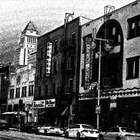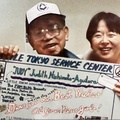Read Chapter Three >>
A seventy-eight-year-old Japanese woman from Fukushima is found dead from a blow to the head in an alley next to Japanese Village Plaza in Little Tokyo. Her fifty-year-old Sansei son, described as a “loser” by his very uptown sister, walks into the mother’s senior housing unit with a hammer in his pocket immediately afterwards. Yup, it did sound suspicious. Yes, it could be incriminating. But, in my thirty years of detecting, I’ve learned that you can’t make a conclusion just based on two pieces of information. The information has to be linked with hard evidence and witnesses. At this point, we had neither.
I try to tell this to Bet, the deceased’s daughter and my new well-paying client, but she won’t listen. “Here’s your retainer,” she places a check for five hundred dollars on my desk. From her wallet comes something else, a photograph, presumably of Eric Fujii. “Just get the dirt on my brother.” With her high-heels clicking on my cheap linoleum floor, she marches from my office into the waiting room. On my daughter Maddy’s reception table, she leaves a half-empty Kirkland water bottle, lipstick circling the opening.
When she’s gone—and I check down our stairs a couple of times, Maddy rolls her eyes. “What is up her butt?” she says.
“Heeeey, none of that, young lady. That woman is a customer. A customer who just wrote us a nice check.”
“So can we go shopping for some CDs?” Maddy asks. Oh, why can’t she be like all the other teenagers and steal pirated music from the Internet? “And maybe some manga?”
“No. This check is going into my bank account. Which is where I’m going now.”
“Can I go with you?” Now her voice takes on a softer tone.
“Who’s going to watch the office while we are away?”
Maddy shrugs her shoulders in a weird, jerky way. I know what she’s insinuating. For what purpose? It’s not like our phone is ringing off the hook, and most of our clients have my cell phone number, anyway.
“Okay, but I may put you to work.”
“Doing what?” Maddy stumbles out of her chair and then hands me a Post-It. “Oh, your probation officer told me to give you this.” In her circular, loopy handwriting, Maddy has written Far East Lounge, 7 PM.
“What’s this again?”
“You know, the meeting you’re supposed to go to. The whole being anonymous thing.”
“Oh, yeah.” How quickly I have forgotten. Narcotics Anonymous meeting, just a few doors down on the first floor.
I’ve done a few sessions of those recovery groups before. One time it was to save my marriage. Didn’t work. The other time was for me not to get arrested again. That didn’t work either. I wasn’t too keen to do it again, but if I wanted to stay out of jail and spend the summer with my kid, I had to play along.
I put on my sunglasses and Maddy follows suit by wearing my old Ray-Bans. I had no idea why she wants those, but it seems to be one of the few things of mine that she desires.
On the sidewalk the shopkeeper of the rice cracker shop takes a break leaning on an empty newspaper rack. His name is Howie Hanabata, and while we are exactly the same age, he actually acts and looks like he’s twenty years older.
“You look like the Terminator. Going to catch some criminals?” Howie wears a long apron stained with long brown spots. Most likely some kind of soy sauce concoction he brushes on his rice crackers.
“Uh, no, we’re going to the bank,” I say.
“Who’s that, your assistant?”
“No,” I say, not providing any more information.
As we walk away, Maddy comments, “That guy’s kind of weird.”
“Don’t say that.”
“You think so, too.”
“It’s just that we’ve known each other a long time.”
“You have?”
“We used to play baseball together. In Boyle Heights.”
“That’s around here. I thought that you grew up in Huntington Beach.”
“My grandfather thought it would be good if I hung out with Nihonjins.”
“What are those?”
“Nihonjin. Buddhaheads. You know, Japanese people.”
Maddy frowns. She’s probably trying to picture me with other Sansei boys. “So what’s his story?” When I don’t answer right away, she adds, “The owner of the rice cracker shop. Mr. Hanabata.”
The evils of bullying are being discussed everywhere, in the context of social media. But the truth is bullying has been around since the birth of man. And I’m not proud to say that in the Seventies, I had mastered the art of bullying myself when it came to Howie Hanabata. We stuffed him in a park trashcan. Called him senbei head and arare breath. Why? I guess it goes back to Darwin. And Howie was the weakest link.
“We just weren’t that close,” I say. “You know how it is.”
After I deposit the check in my bank’s ATM, I get on the phone with my contact in the LAPD, Officer Doug Brenner. It’s not like he’s a homicide detective, but he’s my closest connection.
“You know that I can’t give you anything, Kev,” he tells me.
“I was just hired by the woman’s daughter.”
“The detectives aren’t going to like that.”
“C’mon, Doug, anything. Have they found the murder weapon?”
“If I hang up, the answer is negative,” he says and then I hear nothing else on the line.
So no murder weapon yet.
I go by the senior housing, Nikkei Machi. Compared to the other low-income units in the area, it’s small. Only about thirty units.
We go into the lobby and a young woman is behind the desk. I try to sweet talk her but she’s not going to let me anywhere near Satoko Fujii’s room. I notice the security cameras aimed at the door, the same ones that had recorded Eric Fujii, hammer in pocket, entering the premises the day his mother was killed. Japanese Village Plaza is conveniently only a block away.
As we make our way out, I see an older woman pulling a wire basket on wheels. “Excuse me—” I say. “Did you know Mrs. Fujii?”
“She my neighbor,” the woman says. She gives me the once over and Maddy the twice over. I pull off Maddy’s sunglasses to make her look less threatening. “I can’t believe. Little Tokyo so danger now.”
“I’m a private detective. Hired to investigate her murder.”
“Detective?” The woman is impressed. “Never met a private detective before.”
“Are you familiar with her son?” I usually wouldn’t bring up something like that so quickly, but I did get firm instructions from my client to do so.
“That boy? Oh, he’s no good. Warui.”
Hearing those words made my ears burn. Warui. Bad. Sometimes waru bozu, bad boy. I remember my Issei grandparents saying that about me. They didn’t approve of my long surfer hair, my clothing, the puka shells. My grandfather claimed that I looked like a girl.
“What makes you say that?”
“He come late at night. He’s not supposed to live here. This for seniors. But he has no place to go. What shame.”
Hearing the word, “shame,” gives me the shakes. Being Japanese and dealing with shame is a lethal combination. I know that I should be asking her more questions, but it’s too hard with Maddy right there. I give her my business card and ask to visit her at another time.
As we approach a statue of a Japanese diplomat who gave out visas to Jews during World War Two, I slow down and address my daughter. “There’s something I want to talk to you about—”
Maddy looks confused.
“Well, you know this statue got tagged this past weekend. Along with the Friendship Knot by Weller Court.”
“Yeah?” Maddy now standing there, in front of Starbucks, practically daring me to say it.
“I mean, I know that you wouldn’t ever do anything like that. Not in Little Tokyo.”
Maddy’s face literally falls. “You’re just like Mom. I mess up one time, and you think I’m bad. What’s that word that lady said—warui.”
She runs ahead of me.
“Maddy, Maddy,” I call out but she doesn’t slow down. Finally I catch up to her in front of Far East Café.
“Don’t you have your meeting?”
I glance at my watch. It’s five past seven. “Oh, yeah.” I hand her a twenty dollar bill and tell her to pick up herself dinner and meet me back at our apartment in an hour.
The freedom that I’m giving her lifts her bad mood and she’s gone in a flash. I, meanwhile, make my way to the neighboring lounge, a little out of breath. A bunch of people are sitting in folding chairs, listening to some guy speak.
I immediately recognize the Asian guy standing in front. He has the same face as the guy in the photo in my pocket. Eric Fujii, my No. 1 suspect.
© 2014 Naomi Hirahara





